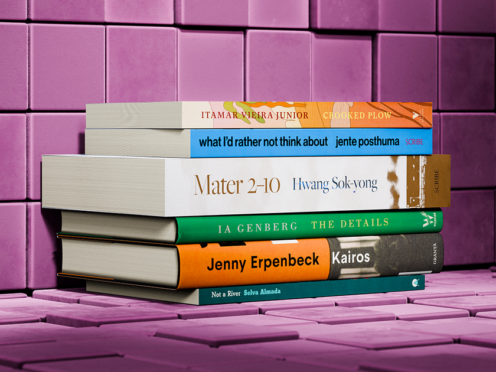European and female authors have dominated the 2024 International Booker Prize shortlist.
The six books, which focus on issues such as racism and oppression, are competing for the translated fiction award, which splits the £50,000 prize money equally between the translator and author.
This is the first time authors from Sweden and Brazil have made the list and the fourth time in five years an Argentine writer is up for the prize. And for the third year running, a South Korean author has been shortlisted.
Authors from Germany and the Netherlands are also on this year’s shortlist.
We are delighted to reveal the #InternationalBooker2024 shortlist, featuring six books ‘that interweave the intimate and political in radically original ways’.
➡️ Discover the full list: https://t.co/JQYmgLwhox pic.twitter.com/GX6WyUDKpy
— The Booker Prizes (@TheBookerPrizes) April 9, 2024
Broadcaster Eleanor Wachtel, chairwoman of the International Booker Prize 2024 judges, called the shortlist “implicitly optimistic” while engaging with “current realities of racism and oppression, global violence and ecological disaster”.
She said the books open onto “vast geographies of the mind, often showing lives lived against the backdrop of history or, more precisely, interweaving the intimate and the political in radically original ways”.
“These books bear the weight of the past while at the same time engaging with current realities of racism and oppression, global violence and ecological disaster,” Wachtel said.
“Some seem altogether timeless in their careful and vivid accounts of the dynamics of family, love and heartbreak, trauma and grief.”

The female authors include Argentine writer Selva Almada for Not A River, about life in a rural area; German opera director Jenny Erpenbeck who wrote Kairos about the end of the Cold War in Germany; Sweden’s Ia Genberg for anthology-style The Details and Dutch author Jente Posthuma’s family story What I’d Rather Not Think About.
The male authors on the shortlist are South Korean Hwang Sok-yong for Mater 2-10, about the Japanese occupation, and Brazilian Itamar Vieira Junior’s debut and family drama Crooked Plow.
Erpenbeck had previously featured on the longlist for Go, Went, Gone along with Sok-yong for At Dusk.
Wachtel said that Erpenbeck’s latest work was an “intense, rich drama about the entanglement of personal and national transformations during the dying years of East Germany”.
Since 2016, when it became an annual award for a single work, female authors have been shortlisted a third times more than male authors.
Independent books lead the way in 2024 with five making the shortlist.
Authors from Germany, Brazil, Sweden and Argentina have never been winners while writers from South Korea, Han Kang for The Vegetarian in 2016, and the Netherlands, Lucas Rijneveld for The Discomfort Of Evening in 2020, have taken home the prize.
Each of the shortlisted titles are allocated £2,500 for the author and £2,500 for the translator.
The International Booker Prize 2024 ceremony will take place from 7pm on May 21 at the Tate Modern.
